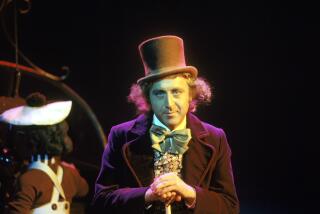Wilder’s ‘Ace’ is a classic
- Share via
FILMS don’t come more cynical, scathing or brilliant than Billy Wilder’s 1951 drama “Ace in the Hole,” which finally makes its DVD debut Tuesday. What’s most shocking about the film, though, is that it ever got made.
That’s because Wilder was riding high when he made the film, having just scored an artistic and commercial triumph with his 1950 black comedy about Hollywood, “Sunset Boulevard.” So Paramount gave him the green light to do “Ace.”
Penned by Wilder, Walter Newman and Lesser Samuels, “Ace in the Hole” is Wilder’s unblinking condemnation of American society. It sadly seems remarkably prescient now, a foreshadowing of the round-the-clock gossip and tabloid world we now live in.
It stars Kirk Douglas as Chuck Tatum, a down-on-his-luck newspaper reporter -- a self-described $250-a-week journalist who can be hired for just $50 -- who has been fired from seemingly every major paper in the country. He ends up working at a daily in Albuquerque on the condition that he avoid the bottle. Fast forward a year and Tatum is bellowing his disdain for the mundane stories he’s given -- spurred on by his renewed drinking -- while hoping for the one big story that will be his ticket back to the major papers.
He finds that story when his editor (Porter Hall) sends him and cub reporter Herbie Cook (Bob Arthur) to cover a rattlesnake hunt. Along the way, Tatum and Herbie stop their car at a trading post to get gas and discover that the post’s proprietor, Leo (Richard Benedict), has become trapped in a cave while searching for Indian treasures.
When a local Indian tells Tatum that the cave is in the sacred Mountain of the Seven Cultures, he can smell a story. And he begins to milk the poor man’s plight for all it’s worth, even prolonging his rescue so he can keep the story going. As the story begins to spread beyond the Albuquerque press and onto the wire services, hundreds of looky-loos in cars along with street vendors, radio and TV shows and even a carnival, show up to watch the events unfold.
Though Tatum has the sheriff and others doing his bidding, he can’t control Leo’s wife, Lorraine (Jan Sterling), who is bored with her husband and sees Leo’s plight as an opportunity to leave him. Tatum, though, knows that if Lorraine abandons her husband in the middle of the crisis, the story won’t be as effective.
But the reporter ends up making a fatal mistake when he forces her to stay. Though ultimately Tatum has remorse for what he’s done, Wilder doesn’t let him get away with anything.
“Ace” was written without Wilder’s longtime writing partner Charles Brackett, who had managed to dilute some of Wilder’s darkest impulses. The resulting script’s relentless pessimism helped make the movie a box-office and critical disaster in the States. Yet it was a critical and financial hit in Europe.
Joe Saltzman, professor of journalism at USC, explained via e-mail that “Ace in the Hole” is “less of a condemnation of journalism than a bitter portrait of one kind of journalist.”
“What the film really goes after is the public response to the story -- the alternate title is ‘The Big Carnival,’ and it’s a more appropriate title -- the public hysteria involving a man trapped in a hole. The story becomes a public circus, and in the end even the journalist can’t control the way the story turns out.”
Wilder always thought “Ace in the Hole” was a triumph. Running into his collaborator Newman years later, Wilder told him: “It was the best thing I ever did.”
--
More to Read
Only good movies
Get the Indie Focus newsletter, Mark Olsen's weekly guide to the world of cinema.
You may occasionally receive promotional content from the Los Angeles Times.










